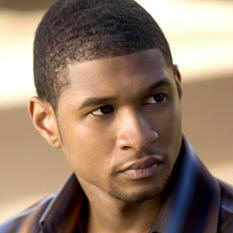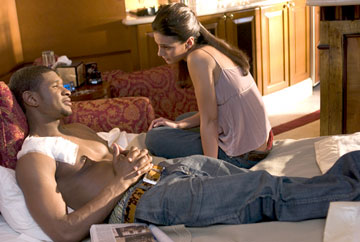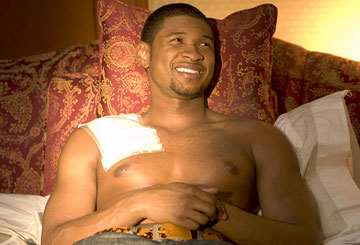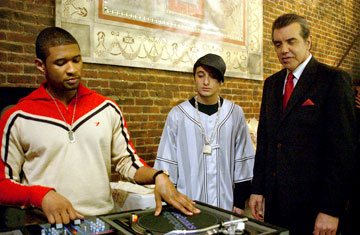

PopEntertainment.com > Feature
Interviews - Music >
Feature Interviews - Actors >
Feature
Interviews U to Z > Usher
 USHER
USHER
GETTING INTO THE MOVIE MIX
by
Brad Balfour
Copyright ©2005
PopEntertainment.com. All rights reserved.
Posted:
December
1, 2005.
For Usher
Raymond IV, making the move from R&B superstar
/ singer /
composer (his most
recent album Confessions sold nine million copies) to actor had to
present some risks – if not to his pocketbook, then to his ego. But Usher
decided to take that risk when he was offered the role of Darrell for
In the Mix – a deejay turned bodyguard for a Mafioso's daughter.
Though he handles a gun for about a minute, the role is more about romance
than hip hop gangsterism.
Though you've had an incredibly successful music career are you afraid
you won't be taken seriously as an actor?
To be honest with you, I try to feed off positive energy, to push me
forward, and actually negative at the same time. Once there is an opinion
about what I'm doing, I better gauge how much work I have to do or whether
I'm moving in the right direction. The same way as an artist. Once there
was a time that no one knew who Usher was. Nobody was excited about Usher
as an artist and it took time to build and work the Chitlin' Circuit to be
introduced to new fans. You have to work the process the same as an
artist, however, there's a lot more pressure. But as I said, I thrive off
positive energy. Negative energy, I keep it away from me, but I use it as
motivation.
You were also executive producer on this movie. What did that involve?
My executive producer responsibility was based on my opinion and my
ability to be part of a committee, selecting the actors associated with
the film, I kinda of leave the directing to our director, but having a
certain opinion about cuts. Once we were finished with the film, the
editing, the music, the soundtrack.
 Aren't there hundreds of scripts thrown at you? So what made you choose
this one?
Aren't there hundreds of scripts thrown at you? So what made you choose
this one?
One was the people that were associated with one. Lions' Gate stood
strongly behind this film. Two was my theatrical agent, Holly Davis
Carter, and just the idea that so many years we've been talking about the
type of roles I was looking for. They don't make characters like this.
When she found this, she brought it to me, and said, "What do you think
about this character?" I liked it, but obviously there were a few things
we had to work out, to get the right cast to act it, but it was a good
point to start. Becoming involved as the executive producer and choosing
the actors and actresses I would play opposite such as Chazz Palminteri,
when that happened, I was like, "Oh yeah, we're definitely going to make
this movie." I felt the script embodied a new character, differently from
the urban character you see nowadays as a gangster, or an individual with
a gun. I felt what this does is shed new light on black characters. And
just looking at what Ice Cube did as a director, and my being involved as
executive producer, this was my opportunity to touch in that area.
Your name had come up for doing something like Rent.
That was one of the first things I considered before In the Mix. I
wanted to be associated with that would embody all the elements of
entertainment. To be a triple threat is similar to being compared to
people like Fred Astaire, Gene Kelly, Frank Sinatra, or even Elvis Presley
and Sammy Davis, Jr. Those artists sang, danced, composed, as well as
entertained. They call them triple threats to keep to the tradition, but I
looked as this one, you know, it was an acting piece that had that was
related to entertaining, rather than okay Usher dance. As a matter of
fact, I did my best to make my character look like he couldn't dance. That
goofy scene at the end when I do this rerun, I hope people will get a
laugh out of it.
 Do you think the key to longevity is understanding the business side?
Do you think the key to longevity is understanding the business side?
Well certainly. You want to make smart business decisions to take care of
you when you're 40 and 50 years old. You don't have to continue to do back
flips. I enjoy dancing, but I don't want to have to do it at 50 or 40. I
want to have the leisure of making a choice, rather than be put in a
position where I have to do on stage, where my lights are going to be
turned off or I'll be bankrupt.
Did you always have an aptitude for business?
Well it grew out of being a hundred-aire and wanting to be a millionaire.
For years, I wanted to do so much, and having a mother to watch my back
the way she did, she kind of motivated me to becoming the motivating force
for me to understand the business side of it more. Physically and
creatively spend most of my time doing what I did and I noticed that
there's business at hand that has to take place. I wanted to get more into
it, so I shifted my team and said, "That's go after these types of deals.
I want to know more about this. And for the meetings I began to wake up a
little bit earlier Artists will wake up
two o'clock in the afternoon. I moved that to
ten o'clock and finally moved it on down to nine. Business
is important, it's more important than all of the creative if you can
believe that. If you can find a creative balance between the two, I think
that's really being in control of your career.
Your fifth album, Confessions released in 2004 , was a
huge hit. When is the follow-up?
I don't have a record dropping now. That's not my process. Normally, I'll
work on an album and then I'll go away and work on a movie or a few
movies, or
 whatever business I have at hand. My responsibilities are
beginning to stack up like homework. I have to finish different things.
I've become part of an ownership group of the Cleveland Cavaliers, as I
said developing and working and introducing new pieces to the brand Usher
– the dance tape, other products. I hope I'll be back by 2006 to hopefully
release an album in 2007. Don't count me out yet, I might do something
with one of my artists. Rico Love has a chance of coming out with a CD in
the coming year. So I might give you a little treat there. As a
businessman, I think it's important to have a wide demo and a well
diversified portfolio. As you look at what other
entertainers-turned-businessmen have done, it's off the back of who they
are as entertainers. I looking to go in a different direction, do that in
the clothing line as well, but also look to do things that are not
normally done. There's only a handful of minority business owners, I'm
proud to be in that group. I might say too much sometimes, because my
partners will say, "We're a team. We're an ownership group." I'm like
"Cleveland Cavaliers" (raising his voice) I'm excited about it.
That at such a young age so much could be accomplished. (He's 26.) I think
it is to be recognized and talked about. As far as responsibility on my
part, I don't hire or fire coaches or players, but I am part of a
committee that has to make decisions on behalf of the Cleveland Cavaliers.
I take meetings. Some of the ideas are way over my head. I understand I'm
an entertainer first, as it relates to game time presentation, I have
ideas. I sort of like to keep it in the direction of entertainment,
everything I do.
whatever business I have at hand. My responsibilities are
beginning to stack up like homework. I have to finish different things.
I've become part of an ownership group of the Cleveland Cavaliers, as I
said developing and working and introducing new pieces to the brand Usher
– the dance tape, other products. I hope I'll be back by 2006 to hopefully
release an album in 2007. Don't count me out yet, I might do something
with one of my artists. Rico Love has a chance of coming out with a CD in
the coming year. So I might give you a little treat there. As a
businessman, I think it's important to have a wide demo and a well
diversified portfolio. As you look at what other
entertainers-turned-businessmen have done, it's off the back of who they
are as entertainers. I looking to go in a different direction, do that in
the clothing line as well, but also look to do things that are not
normally done. There's only a handful of minority business owners, I'm
proud to be in that group. I might say too much sometimes, because my
partners will say, "We're a team. We're an ownership group." I'm like
"Cleveland Cavaliers" (raising his voice) I'm excited about it.
That at such a young age so much could be accomplished. (He's 26.) I think
it is to be recognized and talked about. As far as responsibility on my
part, I don't hire or fire coaches or players, but I am part of a
committee that has to make decisions on behalf of the Cleveland Cavaliers.
I take meetings. Some of the ideas are way over my head. I understand I'm
an entertainer first, as it relates to game time presentation, I have
ideas. I sort of like to keep it in the direction of entertainment,
everything I do.
And you have this DVD out called Truth Tour.
You celebrate because there's so much behind it; that went into it. In
reality, anyone that actually saw the tour in person knows how much heart
and soul was put into it. The travel or the journey I set out on years ago
when I first moved to
Atlanta,
GA,
is embodied in this piece. We made it all the way back to Philips Arena
and I just talk about, what it is, it isn't just a show, I take you behind
the scenes, I let you see what happens, behind the tour and beyond. I take
you on a trip where I started my musical career. What I wanted, what I
saw. My family members, my closest friends, people in the industry.
There's also a day-to-day documentary, my day-to-day behind the tour. I
also talk about my plans as a businessman, as a part-owner of the
Cavaliers, as a philanthropist, developing a clothing line, and my
direction – where I am going.